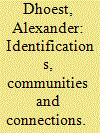| Srl | Item |
| 1 |
ID:
143649


|
|
|
|
|
| Summary/Abstract |
This paper explores sexual and ethnic-cultural identifications among first- and second-generation gay migrants in Belgium. Based on a theoretical framework highlighting the multiple, fluid and intersectional nature of identifications, 29 in-depth interviews are used to study self-identifications and connections to different communities. Drawing on a diverse sample, three clusters of participants can be distinguished: second-generation migrants, who were born in Belgium; sexual refugees, who escaped to Belgium; and voluntary migrants, who chose to move to Belgium. Ethnic-cultural and sexual identifications interact and vary between these groups of participants, but also within them as they intersect with other social positionings such as class, gender and race.
|
|
|
|
|
|
|
|
|
|
|
|
|
|
|
|
| 2 |
ID:
191707


|
|
|
|
|
| Summary/Abstract |
This article examines To T, or Not To T?, a solo play by D’Lo, a queer transmasculine Sri Lankan Tamil American performance artist and comedian. Considering the Super Aunty character, I examine how aunties orient diasporic life towards multiple modes of belonging and exclusion. Specifically, I explore how Aunty Discipline directed toward the queer diasporic child is vital in creating future hetero-reproductive diasporic subjects, then consider the intimacies of fictive kinship through the term ‘fam’. The queer diasporic body is a text on which others enact diasporic meanings, but D’Lo uses that very queer body to actively reimagine and re-image family and community, thereby infusing these spaces with his own queer ontologies and epistemologies.
|
|
|
|
|
|
|
|
|
|
|
|
|
|
|
|